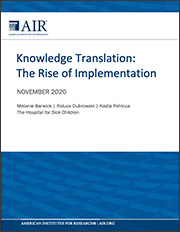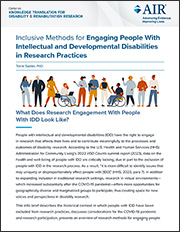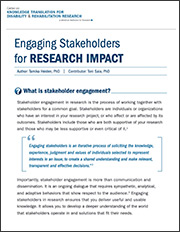Info Briefs
The KTDRR Center offers information briefs on topics related to strategies to enhance KT outcomes and impact, as well as high-quality synthesis of research, through collaboration with national and international experts.
Knowledge Translation Info Briefs address the need to provide reliable knowledge about feasible approaches to KT, as well as topics reflecting grantees’ technical assistance requests. These Info Briefs synthesize and disseminate information from the KT literature and describe KT strategies for particular audiences, along with their research base.

Barwick, M., Dubrowski, R., & Petricca, K. (2020). Knowledge translation: The rise of implementation. Center on Knowledge Translation for Disability and Rehabilitation Research, American Institutes for Research
- HTML version: ktdrr.org/products/kt-implementation
- Download: KT-Implementation-508.pdf (Accessible, Sec. 508-compliant PDF file of the KT Implementation Info Brief)
About the KT Implementation brief
Knowledge Translation: The Rise of Implementation is a monograph commissioned by the Center on Knowledge Translation for Disability and Rehabilitation Research (KTDRR). Lead author Melanie Barwick is an internationally recognized expert in knowledge translation (KT) and implementation science (IS). Raluca Dubrowski and Kadia Petricca complete the author team. The monograph provides an update of the KT literature and reflects on advancements in the KT process, as well as KT’s relationship with IS. KT practices related to disability research are highlighted along with a look at future directions in KT.

Sadler, T. (2023). Methods for engaging people with intellectual and developmental disabilities in research practices. Center on Knowledge Translation for Disability and Rehabilitation Research, American Institutes for Research.
- Download: KTDRR-EngagingPeopleWithIDD-508.pdf (Accessible, Sec. 508-compliant PDF file of the Engaging People With IDD Info Brief)
About the Engaging People With IDD brief
Methods for Engaging People With Intellectual and Developmental Disabilities in Research Practices discusses methods for engaging people with intellectual and developmental disabilities (IDD) in research as well as considerations for the COVID-19 pandemic and research participation. A list of resources for including people with disabilities in research practices is provided for disability researchers, practitioners, and advocates.

Heiden, T. & Saia, T. (2021). Engaging stakeholders for research impact. Center on Knowledge Translation for Disability and Rehabilitation Research, American Institutes for Research.
- Download: KTDRR-Stakeholder-Engagement-Brief-508.pdf (Accessible, Sec. 508-compliant PDF file of the Stakeholder Engagement Info Brief)
About the Stakeholder Engagement brief
Engaging Stakeholders for Research Impact defines stakeholder engagement, describes different types of stakeholders and addresses why research projects should focus on engagement. Author Dr. Tamika Heiden is the founder and principal of Australia’s Research Impact Academy. She has over 15 years of experience in translating research into practice. Joining Dr. Heiden is Dr. Toni Saia, a professor and researcher who brings lived experience with disability to her work. Dr. Saia shares an example of how her collaborative research project resulted in accessibility improvements.
